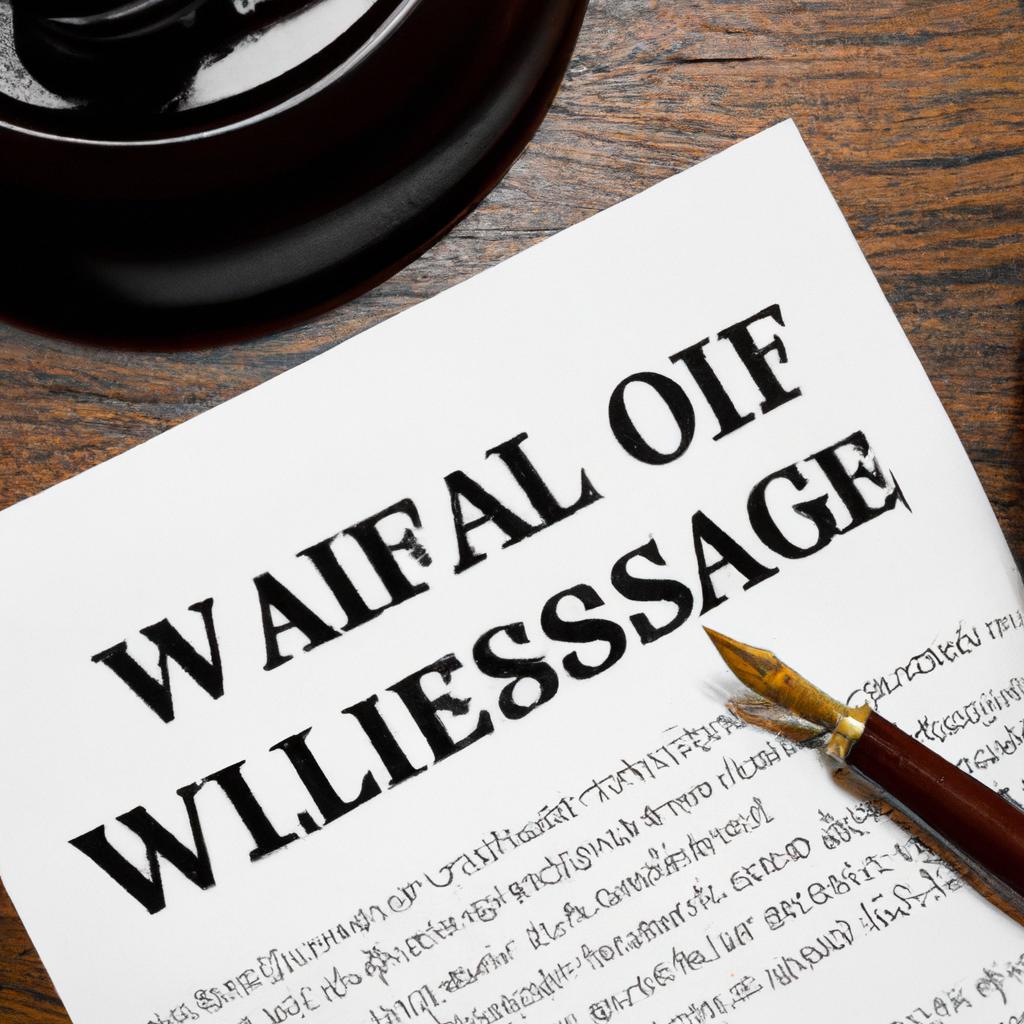Navigating the murky waters of estate law can be a daunting task, especially when faced with the question: “Can I contest a will?” As experienced legal professionals at Morgan Legal Group in New York City, we understand the complexities involved in challenging the validity of a will. In this article, we will delve into the key factors to consider when contemplating a will contest and provide insights into the legal process involved. Join us as we unravel the intricacies of contesting a will and shed light on your rights as a potential beneficiary.
Understanding the Legal Grounds for Contesting a Will in New York
Contesting a will in New York can be a complex process that requires a thorough understanding of the legal grounds for contesting a will. If you believe that a will does not accurately reflect the wishes of the deceased, there are specific legal grounds that must be met in order to contest the validity of the will.
Some common legal grounds for contesting a will in New York include:
- Lack of testamentary capacity: If the testator was not of sound mind at the time the will was created, the will may be considered invalid.
- Undue influence: If someone exerted pressure or coercion on the testator to create or change the will, it may be grounds for contesting the will.
- Fraud or forgery: If the will was created through deceit, misrepresentation, or forgery, it can be contested in court.

Evaluating the Validity of a Will: Factors to Consider
When evaluating the validity of a will, there are several key factors to consider that may allow you to contest it. One important factor is whether the testator had the mental capacity to understand the consequences of their actions when creating the will. If there are concerns about the testator’s mental state at the time the will was made, it may be grounds for contesting its validity.
Another factor to consider is whether the will was executed under undue influence or coercion. If there is evidence that someone exerted pressure or influence over the testator when creating the will, it may be possible to challenge its validity in court. Additionally, if the will does not meet the formal requirements set forth by state law, such as being signed in the presence of witnesses, it could be deemed invalid.

Exploring the Process of Contesting a Will in Court
If you are considering contesting a will in court, it is crucial to understand the legal process involved. Contesting a will can be a complex and emotional process, requiring careful consideration and expert legal guidance. Here are some key steps to keep in mind:
- **Gather evidence:** Before contesting a will, it is essential to gather evidence to support your claim. This may include testimonies from witnesses, financial records, and medical reports.
- **Seek legal counsel:** Contesting a will requires a thorough understanding of probate law. It is highly recommended to seek the guidance of an experienced estate planning attorney who can help navigate the legal complexities and represent your interests in court.
| Date | Event |
|---|---|
| January 10, 2022 | Will drafted by deceased |
| February 5, 2022 | Deceased passes away |
| March 20, 2022 | Will presented for probate |

Seeking Legal Guidance and Representation for Will Contest Cases
If you are considering contesting a will, it is crucial to seek legal guidance and representation from experienced professionals in the field. At Morgan Legal Group in New York City, our team of skilled attorneys specializes in handling will contest cases and can provide you with the expert advice and support you need.
When contesting a will, it is essential to have a strong legal strategy in place to increase your chances of a successful outcome. Our attorneys at Morgan Legal Group have the knowledge and expertise to assist you in navigating the complex legal process and advocating for your rights. Contact us today to schedule a consultation and discuss your options.
Q&A
Q: Can I contest a will?
A: Yes, you can contest a will if you believe it is invalid or unfair.
Q: What are some common reasons for contesting a will?
A: Some common reasons include lack of capacity, undue influence, fraud, or improper execution.
Q: How do I go about contesting a will?
A: You will need to file a formal legal challenge in court, typically with the help of a lawyer specialized in estate planning.
Q: What is the process like for contesting a will?
A: The process can be complex and time-consuming, involving gathering evidence and presenting arguments in court.
Q: What are the potential outcomes of contesting a will?
A: If successful, the will may be declared invalid or certain provisions may be changed. However, there is no guarantee of a favorable outcome.
Q: Is there a time limit for contesting a will?
A: Yes, there is usually a limited window of time in which you can contest a will after it has been probated.
Q: Will contesting a will strain family relationships?
A: Yes, contesting a will can potentially strain family relationships, as it may lead to disputes and disagreements among beneficiaries.
Q: Are there any alternatives to contesting a will?
A: Yes, you may consider mediation or negotiation with other beneficiaries to reach a mutually agreeable solution before resorting to legal action.
In Summary
In conclusion, contesting a will can be a complex and emotional process. It is important to carefully consider all factors before deciding to pursue legal action. Seeking advice from a qualified legal professional can help navigate the challenges and uncertainties that may arise. Remember, every case is unique and outcomes can vary. Ultimately, the decision to contest a will should be made with thoughtful deliberation and consideration of all parties involved.
 Can I Contest a Will? A Guide to Challenging a Will Legally
Can I Contest a Will? A Guide to Challenging a Will Legally
Losing a loved one is a heart-wrenching experience, and dealing with legal matters on top of that can make the grieving process even more difficult. In some cases, you may find yourself questioning the validity of the will left behind by the deceased. This can lead to wanting to contest the will, but the process can feel overwhelming and intimidating. In this comprehensive guide, we will navigate the legalities of contesting a will and provide valuable information to help you understand the steps involved.
What is a Will?
Before diving into the specifics of contesting a will, it’s essential to understand what a will is and its purpose. A will is a legal document that outlines how a person wants their assets to be distributed after their passing. It also names an executor, who is responsible for carrying out the wishes as stated in the will. A will can also include other important instructions, such as appointing guardians for minor children or naming beneficiaries for life insurance policies or retirement accounts.
What Does it Mean to Contest a Will?
When someone contests a will, they are challenging its validity. This essentially means that they are either questioning the legality of the will, or the way in which it was created or executed. Contesting a will is not a decision to be taken lightly, as it involves challenging the final wishes of a deceased person.
Valid Reasons to Contest a Will
While there may be a variety of reasons one might want to contest a will, there are specific legal grounds that are considered valid by the court. Some of the most common valid reasons for contesting a will include:
1. Mental capacity: A person must be of sound mind and fully aware of the decisions they are making when creating a will. If there is evidence that the testator (the person creating the will) lacked the mental capacity to understand their actions, the will may be deemed invalid.
2. Undue influence: If there is evidence that someone used their position of power to unduly influence the testator when creating the will, it may be considered invalid. This could include situations where an individual coerced or forced the testator into leaving them certain assets.
3. Fraud or forgery: If there is evidence that the will was forged or created through fraudulent means, it may be deemed invalid.
4. Improper execution: For a will to be considered legally binding, there are specific requirements for how it must be executed. This could include things like having it signed by two witnesses in the presence of the testator. If these requirements were not followed, the will may be considered invalid.
How to Contest a Will
If you believe you have valid reasons to contest a will, the first step is to seek legal counsel. An experienced lawyer familiar with estate laws and the probate process can advise you on the best course of action and guide you through the legal proceedings. They can also help gather evidence and build a strong case to support your claim.
In most cases, a will must be contested within a specific time frame after the testator’s passing. This timeframe varies depending on the state, so it’s crucial to act promptly. Missing the deadline can result in the court refusing to hear your case.
What Happens When a Will is Contested?
When a will is contested, it is then up to the court to determine its validity. This process can vary depending on the state and the circumstances surrounding the contestation. A judge may ultimately decide to uphold the will, declare it partially valid, or invalidate it entirely.
It’s also important to note that contesting a will can be a lengthy and costly process. This is why it’s essential to have a strong case and the right legal representation.
Benefits of Contesting a Will
There are several benefits to contesting a will, including:
1. Ensuring the deceased’s final wishes are carried out: When a will is contested, the court thoroughly examines its validity. If the will is deemed invalid, it can then be set aside, and the deceased’s assets can be distributed according to state laws. This ensures that the deceased’s final wishes are carried out fairly.
2. Protecting beneficiaries: Contesting a will can also help protect the interests of beneficiaries. If there is evidence that the will was changed under dubious circumstances, it may be declared invalid, and the intended beneficiaries can receive their rightful inheritance.
3. Closure and peace of mind: Sometimes, contesting a will is not about the assets involved but seeking closure and peace of mind. If you believe the will was not a true reflection of the testator’s wishes and feel that justice needs to be served, contesting the will can give you the closure you need.
Tips for Contesting a Will
1. Seek legal counsel immediately: As mentioned earlier, it’s crucial to seek legal counsel as soon as possible if you plan to contest a will. A lawyer who specializes in estate law can help you understand the process and advise you on the best course of action.
2. Gather evidence: Your case will be stronger if you have evidence to support your claims. This could include medical records, witnesses, and other relevant documents.
3. Be prepared for a lengthy process: Contesting a will can be a lengthy and costly process. It’s essential to be mentally and emotionally prepared for this, as it can take a toll on you and your family.
4. Consider mediation: In some cases, mediation can be a quicker and less costly alternative to court proceedings. This option involves working with a neutral third party to reach an agreement.
Contesting a Will: Case Studies
In recent years, there have been several high-profile cases of individuals successfully contesting a will based on valid reasons. One such example is the case of two Australian sisters who contested their stepmother’s will after she left her entire estate to her own children. The sisters claimed that their stepmother was not of sound mind when creating the will, and the court ultimately deemed it invalid, awarding the sisters a significant portion of the estate.
In another case, a man contested his father’s will after discovering that his father’s signature had been forged. The court determined that the signature had, in fact, been forged, and the will was declared invalid.
First Hand Experience
Contesting a will can be a difficult and emotionally charged process. Here are some insights from individuals who have gone through this experience:
“I always felt that my mother’s last will did not reflect her true wishes. After seeking legal counsel, we were able to successfully contest the will based on fraudulent means used by my siblings to unduly influence her. While the process took a toll on our family, it was important for me to fight for what I knew was right.” – Sarah, 52
“My brother and I decided to contest our father’s will after discovering that it had been changed in his final days, leaving us with nothing. It was a long and difficult process, but it brought us closure knowing that justice had been served.” – David, 45
Final Thoughts
Contesting a will is a complex and challenging process that should not be taken lightly. Seeking legal counsel and having a strong case is crucial for a successful outcome. It’s also essential to consider the emotional and financial toll that this process can take on a family. However, it can also bring closure and ensure that the final wishes of the deceased are carried out fairly. If you are considering contesting a will, it is best to seek legal advice and carefully consider all options before making a decision.







